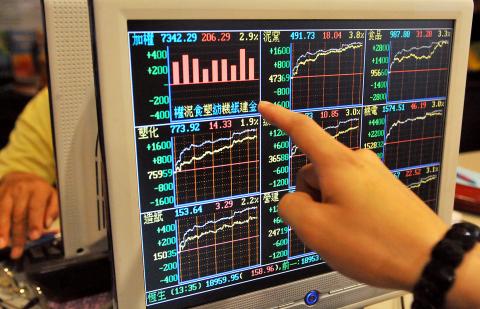The nation’s benchmark index rose the most in five months yesterday after investors welcomed a capital gains tax plan on securities investments proposed by the Chinese Nationalist Party (KMT) legislative caucus, believing the proposal may allow them to pay less tax on stock investment gains than an earlier proposal put forward by the Cabinet.
The TAIEX climbed 0.65 percent at the start of trading on news that the KMT caucus on Monday finalized its own version of a proposal on the capital gains tax on securities investments, analysts said.
The index moved further higher at about noon on news that Minister of Finance Christina Liu (劉憶如) had offered to resign because of substantial differences in the Cabinet’s tax proposal and the KMT proposal, they said.

Photo: Mandy Cheng, AFP
At the end of trading, the TAIEX was 2.89 percent higher at 7,342.29, with turnover increasing to NT$93.09 billion (US$3.14 billion) from NT$44.17 billion in the previous session, the lowest since Jan. 19, 2009, stock exchange data showed. As of Monday, the TAIEX had tumbled 11.22 percent since March 28, when Liu unveiled the Cabinet-backed proposal, data showed.
Under the KMT caucus’ proposal, individual investors would be given the choice of either paying a predetermined tax on the value of trades when the TAIEX rises above 8,500 points, or reporting their gains (or losses) on the stock market with the rest of their income on their annual tax returns.
Pundits said the KMT’s proposal would have the least impact on the bourse, given the rarity of the TAIEX staying above the 8,500-point mark in the past two decades.
“The KMT’s bill on the capital gains tax is not ideal, but acceptable compared with other proposals,” said Lawrence Chang (張平沼), chairman of the General Chamber of Commerce of the Republic of China (中華民國全國商業總會).
Chang said the KMT caucus’ bill would essentially maintain the status quo as the TAIEX is unlikely to break the taxable threshold in the foreseeable future with Europe’s debt crisis escalating.
Investors with exposure to local shares could become more profitable and would be willing to contribute more to the state coffers as the TAIEX approaches the taxable limit, he said.
Capital Securities Corp (群益證券) analyst Alan Tseng (曾炎裕) said the market reacted positively to the KMT caucus’ plan as evidenced by the main bourse’s 2.89 percent gain coupled with the large turnover, a rare phenomenon of late. However, he said the taxable threshold may set an upside limit for the TAIEX, but investors by and large do not look that far into the future.
Chang Shu-hui (張淑蕙), a fund manager at Prudential Financial Securities Investment Trust Enterprise Co (保德信投信) forecast that the benchmark index would move within a narrow range of 6,800 to 7,600 in the short term, ahead of Greece’s new general election on June 17.
This story has been updated since it was first published.

MAKING WAVES: China’s maritime militia could become a nontraditional threat in war, clogging up shipping lanes to prevent US or Japanese intervention, a report said About 1,900 Chinese ships flying flags of convenience and fishing vessels that participated in China’s military exercises around Taiwan last month and in January last year have been listed for monitoring, Coast Guard Administration (CGA) Deputy Director-General Hsieh Ching-chin (謝慶欽) said yesterday. Following amendments to the Commercial Port Act (商港法) and the Law of Ships (船舶法) last month, the CGA can designate possible berthing areas or deny ports of call for vessels suspected of loitering around areas where undersea cables can be accessed, Oceans Affairs Council Minister Kuan Bi-ling (管碧玲) said. The list of suspected ships, originally 300, had risen to about

DAREDEVIL: Honnold said it had always been a dream of his to climb Taipei 101, while a Netflix producer said the skyscraper was ‘a real icon of this country’ US climber Alex Honnold yesterday took on Taiwan’s tallest building, becoming the first person to scale Taipei 101 without a rope, harness or safety net. Hundreds of spectators gathered at the base of the 101-story skyscraper to watch Honnold, 40, embark on his daredevil feat, which was also broadcast live on Netflix. Dressed in a red T-shirt and yellow custom-made climbing shoes, Honnold swiftly moved up the southeast face of the glass and steel building. At one point, he stepped onto a platform midway up to wave down at fans and onlookers who were taking photos. People watching from inside

Japan’s strategic alliance with the US would collapse if Tokyo were to turn away from a conflict in Taiwan, Japanese Prime Minister Sanae Takaichi said yesterday, but distanced herself from previous comments that suggested a possible military response in such an event. Takaichi expressed her latest views on a nationally broadcast TV program late on Monday, where an opposition party leader criticized her for igniting tensions with China with the earlier remarks. Ties between Japan and China have sunk to the worst level in years after Takaichi said in November that a hypothetical Chinese attack on Taiwan could bring about a Japanese

STREAMLINED: The dedicated funding would allow the US to transfer equipment to Taiwan when needed and order upgraded replacements for stockpiles, a source said The US House of Representatives on Thursday passed a defense appropriations bill totaling US$838.7 billion, of which US$1 billion is to be allocated to reinforcing security cooperation with Taiwan and US$150 million to replace defense articles provided to the nation. These are part of the Consolidated Appropriation Act, which the US House yesterday passed with 341 votes in favor and 88 against. The act must be passed by the US Senate before Friday next week to avoid another government shutdown. The US House Committee on Appropriations on Monday unveiled the act, saying that it allocates US$1 billion for the Taiwan Security Cooperation Initiative